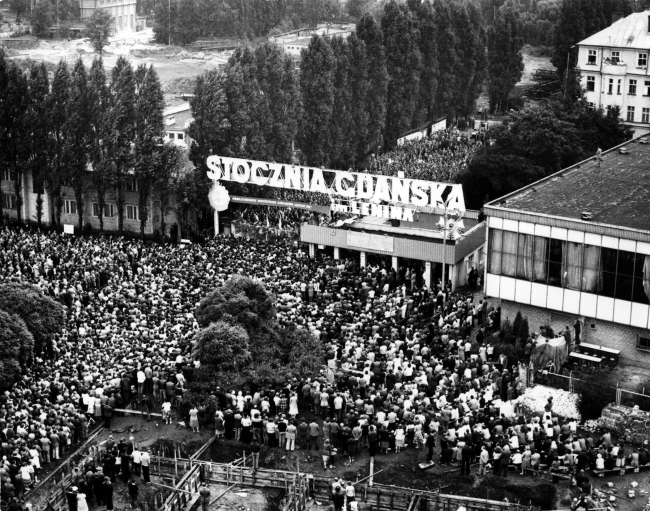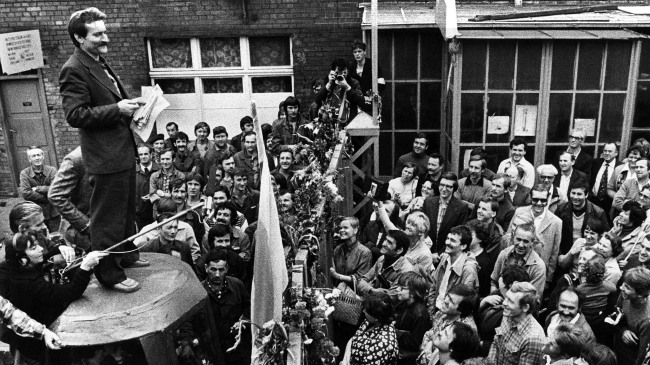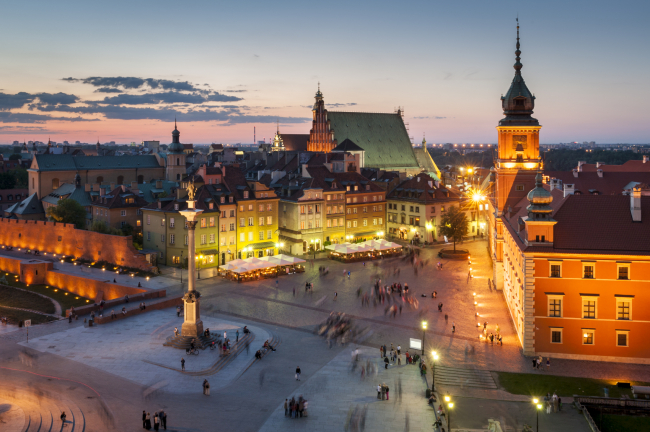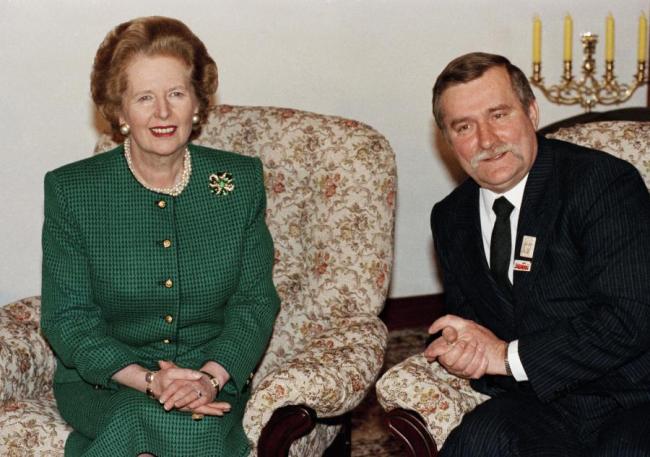[Herald Interview] Poland shares lessons in transition from communism to capitalism
“On the other hand, in 1989 there was no alternative. The economy was ... actually, there was no economy, and that was the point.”
By Joel LeePublished : Aug. 27, 2018 - 20:52
As North Korea strives to reform its economy and lure foreign investments, Poland -- a former communist nation that has successfully transformed into a democracy and market economy -- can share its experience of transition into a rising economic heavyweight in Europe, said the country’s top envoy to Korea in an interview.
“Everything that helped us leave communism was worthwhile,” Polish Ambassador Piotr Ostaszewski told The Korea Herald. “On the other hand, in 1989 there was no alternative. The economy was ... actually, there was no economy, and that was the point.”
Poland, now a Central European economic powerhouse, returned to the league of democracy and a free market economy between the late 1980s and the early 1990s, following 45 years of communist rule. It is now a member of the European Union, North Atlantic Treaty Organization and Organization for Economic Cooperation and Development, among other key international institutions.
Its economy is the eighth-largest EU economy and largest among the former Eastern Bloc members of the EU.
“Everything that helped us leave communism was worthwhile,” Polish Ambassador Piotr Ostaszewski told The Korea Herald. “On the other hand, in 1989 there was no alternative. The economy was ... actually, there was no economy, and that was the point.”
Poland, now a Central European economic powerhouse, returned to the league of democracy and a free market economy between the late 1980s and the early 1990s, following 45 years of communist rule. It is now a member of the European Union, North Atlantic Treaty Organization and Organization for Economic Cooperation and Development, among other key international institutions.
Its economy is the eighth-largest EU economy and largest among the former Eastern Bloc members of the EU.

In the early 1990s, Poland went through a painful process of economic transition guided by the “shock therapy” method -- a policy of macroeconomic stabilization. It was based on the sudden release of price and currency controls, rapid trade liberalization, withdrawal of state subsidies and large-scale privatization of state-owned assets.
Most economists are now in agreement the policy was the appropriate prescription to overhaul a largely centrally planned economy with state ownership -- ridden with inefficiencies, malfeasance and misallocation of resources -- to turn it into a free market economy integrated into European and global value chains.
The shock therapy method sought to tamp down hyperinflation, which reached 640 percent in 1989, and reduce the budget deficit. But it led to high unemployment and worsened the lot of society’s poorest members in the short run.
“The policy caused many problems as well. Many people suddenly became jobless, despite the state no longer ‘pretending’ to pay, and people no longer ‘pretending’ to work. The rich became richer, while the poor became poorer,” the envoy said. “However, it offered freedom of choice. If you had a plan, idea or concept of what to do with your money, you made it. To be real, it was a time of easy money for everyone with an initiative and entrepreneurial energy.”

Unlike North Korea, whose political system is a totalitarian dictatorship and whose economic system has been planned and managed centrally, albeit with a fledgling private economy since the early 2000s, Poland was never a thoroughly communist polity nor economy, he stressed.
“There was a general hatred toward communism,” he said. “The system imposed by the Soviet Union was never accepted by Polish people from the beginning.”
Five large-scale strikes and riots against Soviet rule occurred in 1956, 1968, 1970, 1976 and 1980, leading to frequent protests throughout the 1980s. In 1980, people joined the Solidarity Movement -- a trade union and social movement advocating freedom and democracy -- that became a political force over time.
Economically, Poland had a market economy before World War II, he noted, and private property was sanctioned by the law. It was the only communist country that avoided wholesale collectivization of agriculture, as self-sufficiency was a major feature of its economy.
By the 1980s, a well-informed Polish society demanded reform and economic transformation.
“The price of the transition was pretty high,” the ambassador highlighted. “You must have the guts to push it through.”

According to Harvard Business Review, the power of small and medium-sized enterprises, private businesses and entrepreneurs in driving Poland’s economic transformation was crucial, more than the privatization of state-owned enterprises.
“More than four years into the reform process in Poland, the central mechanism for the reallocation of labor and capital from state to private activities has proved not to be the reorganization and selling-off of large state companies,” it said in a 1995 journal.
“In fact, relatively little progress has been made in turning state companies into viable competitors on domestic and international markets, and the privatization process for large enterprises has stalled. Instead, what has generated new jobs, created significant wealth and provided value to a wide range of customers has been the establishment and growth of hundreds of thousands of new private businesses.”
Regarding North Korea’s potential reform and opening, Ostaszewski said South Korea and the international community should consider “who might be in charge of the transition and what kind of transformation the North wants, including regulations of foreign investments, the extent of government intervention and the model of change it pursues -- be it close to the Chinese, Vietnamese and other models.”
Poland’s transformation was based on the concept of accession into the international community politically as well as economically, he said. “After that followed our accession into NATO and EU. All our reforms were free market-oriented.”

North Korean leader Kim Jong-un addressed the importance of developing the economy in his New Year’s speech, a departure from the official Byungjin policy of simultaneously developing the economy and military that was aggressively endorsed before this year.
A Washington-led pressure campaign coupled with US and international sanctions to cripple the North Korean economy have stifled Pyongyang’s economic lifeline, experts say, noting the regime’s focus is on vitalizing its battered economy.
In the spirit of the April 27 Panmunjom Declaration, Seoul and Pyongyang are in the process of conducting joint research on restoring and modernizing railways and roads connecting the Korean Peninsula, as well as restoring North Korea’s decimated forests. The cooperative activities are an attempt to foster cross-border ties without overstepping the boundaries of United Nations sanctions.
“The late Margaret Thatcher once said that the Soviet Union was an example of ‘the self-imposition of backwardness at the expense of economic progress and people’s decent living,’” the envoy said. “North Korea might be in a stage comparable to the Soviet Union’s late stages. They knew the West was rich. The party elites had money and lived in a different world compared to ordinary people. Having access to information, people started to ask and then demand for change -- and that is the point.”
In the process of “domesticating” capitalism and neoliberalism, Poland’s bold and entrepreneurial class and the “narrow middle class” gained the upper hand in emerging opportunities. Former communist party elites, too, became large beneficiaries. “Many scandals accompanied the new market economy. But people proved to be really entrepreneurial.”

Now, Poland’s vibrant economy is often the talk of the town in an economically fragile Europe. Despite recent abrasive political relations between Brussels and Warsaw, Poles are “very proud to be a member of the EU,” said the diplomat.
Pointing to overwhelming public support for joining the EU in a national referendum in 2003, in which three-quarters of the people voted for the country’s accession, he said, “There was not even a single moment of hesitation.”
He added, “The EU is based on cooperation and simultaneously the protection of particular interests of its members. Poland protects its interests, but as for the raison d’etat, I should say it is about being an active member of this big, successful community.”
Warsaw has received some 215 billion euros ($250 billion) of financial support from Brussels for the 2007-2020 period for developing Polish infrastructure, small and medium-sized firms, universities and other services. As a result of the grant, more than 400,000 new jobs have been created, and thanks to the free movement of labor and services across the Schengen Area, over 2 million Poles have found jobs in the EU market, the ambassador underlined.
Since joining the EU on May 1, 2004, Polish exports to the EU -- making up 75 percent of national export -- have grown threefold, and its agricultural sector income has grown by 70 percent, he mentioned. “Poland’s economy currently is more focused on Europeanization than globalization, and this is the problem we should solve.”
Turning to relations with South Korea -- an official diplomatic partner since 1989 and strategic partner since 2013 -- Ostaszewski underscored the fact that Korea was a leading Asian investor in Poland, with 190 Korean companies operating in Poland’s $615 billion economy. The bilateral trade volume reached $3.7 billion last year, and aggregate Korean investments there exceeded $2 billion.
LOT Polish Airlines inaugurated a direct flight connection between Warsaw and Seoul in October 2016, currently offering five direct flights per week.
“Not only is Warsaw a transfer point, but an important destination for Korean businesspeople and tourists. That paves the way for the development of economic, political, tourist and cultural relations,” he said, adding next year will mark the 30th anniversary of bilateral diplomatic relations.
By Joel Lee (joel@heraldcorp.com)


![[AtoZ into Korean mind] Humor in Korea: Navigating the line between what's funny and not](http://res.heraldm.com/phpwas/restmb_idxmake.php?idx=644&simg=/content/image/2024/04/22/20240422050642_0.jpg&u=)
![[Exclusive] Korean military set to ban iPhones over 'security' concerns](http://res.heraldm.com/phpwas/restmb_idxmake.php?idx=644&simg=/content/image/2024/04/23/20240423050599_0.jpg&u=20240423183955)



![[Graphic News] 77% of young Koreans still financially dependent](http://res.heraldm.com/phpwas/restmb_idxmake.php?idx=644&simg=/content/image/2024/04/22/20240422050762_0.gif&u=)
![[Herald Interview] Why Toss invited hackers to penetrate its system](http://res.heraldm.com/phpwas/restmb_idxmake.php?idx=644&simg=/content/image/2024/04/22/20240422050569_0.jpg&u=20240422150649)





![[Exclusive] Korean military to ban iPhones over security issues](http://res.heraldm.com/phpwas/restmb_idxmake.php?idx=652&simg=/content/image/2024/04/23/20240423050599_0.jpg&u=20240423183955)



![[Today’s K-pop] Ateez confirms US tour details](http://res.heraldm.com/phpwas/restmb_idxmake.php?idx=642&simg=/content/image/2024/04/23/20240423050700_0.jpg&u=)